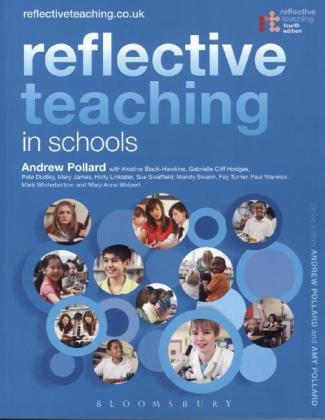Read more
Building on best-selling texts over three decades, this thoroughly revised new edition is essential reading for both primary and secondary school teachers in training and in practice, supporting both initial school-based training and extended career-long professionalism. Considering a wide range of professionally relevant topics, Reflective Teaching in Schools presents key issues and research insights, suggests activities for classroom enquiry and offers guidance on key readings.Uniquely, two levels of support are offered: practical, evidence-based guidance on key classroom issues - including relationships, behaviour, curriculum planning, teaching strategies and assessment processes; routes to deeper forms of expertise, including evidence-informed 'principles' and 'concepts' to support in-depth understanding of teacher expertise. Andrew Pollard , former Director of the UK's Teaching and Learning Research Programme, led development of the book, with support from primary and secondary specialists from the University of Cambridge, UK. Reflective Teaching in Schools is part of a fully integrated set of resources for primary and secondary education. Readings for Reflective Teaching in Schools directly complements and extends the chapters in this book. Providing a compact and portable library, it is particularly helpful in school-based teacher education.The website, reflectiveteaching.co.uk , offers supplementary resources including reflective activities, research briefings, advice on further reading and additional chapters. It also features a glossary, links to useful websites, and a conceptual framework for deepening expertise. This book is one of the Reflective Teaching Series - inspiring education through innovation in early years, schools, further, higher and adult education.
List of contents
Introduction
Part I: Becoming a Reflective Professional
1. Identity. Who are we, and what do we stand for?
2. Learning. How can we understand learner development?
3. Reflection. How can we develop the quality of our teaching?
4. Principles. What are the foundations of effective teaching and learning?
Part II: Creating Conditions for Learning
5. Contexts. What is, and what might be?
6. Relationships. How are we getting on together?
7. Engagement. How are we managing behaviour?
8. Spaces. How are we creating environments for learning?
Part III: Teaching for Learning
9. Curriculum. What is to be taught and learned?
10. Planning. How are we implementing the curriculum?
11. Pedagogy. How can we develop effective strategies?
12. Communication. How does use of language support learning?
13. Assessment. How can assessment enhance learning?
Part IV: Reflecting on Consequences
14. Outcomes. How do we monitor student learning achievements?
15. Inclusion. How are we enabling learning opportunities?
Part V: Deepening Understanding
16. Expertise. Conceptual tools for career-long fascination?
17. Professionalism. How does reflective teaching contribute to society?
List of case-studies, checklists, figures and research briefings
Bibliography
Acknowledgements
Index
Report
This book should adorn every staffroom in the land, being used as a means of support, continuing professional development, ideas plus references to further research and reading. UK Ed Magazine

